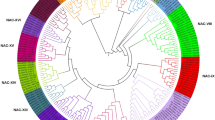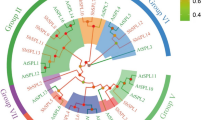Abstract
Intracellular signaling is a critical determinant of the normal growth and development of plants. Signaling peptides, also known as peptide hormones, along with classical phytohormones, are the significant players of plant intracellular signaling. C-terminally encoded peptide (CEP), a 15-amino acid post-translationally peptide identified in Arabidopsis, plays a pivotal role in lateral root formation, nodulation, and act as long-distance root to shoot signaling molecule in N-starvation conditions. Expression of CEP gene members in Arabidopsis is perturbed by nitrogen starvation; however, not much is known regarding their role in other abiotic stress conditions. To gain a comprehensive insight into CEP biology, we identified CEP genes across diverse plant genera (Glycine max, Sorghum bicolor, Brassica rapa, Zea mays, and Oryza sativa) using bioinformatics tools. In silico promoter analysis revealed that CEP gene promoters show an abundance of abiotic stress-responsive elements suggesting a possible role of CEPs in abiotic stress signaling. Spatial and temporal expression patterns of CEP via RNA seq and microarray revealed that various CEP genes are transcriptionally regulated in response to abiotic stresses. Validation of rice CEP genes expression by qRT-PCR showed that OsCEP1, OsCEP8, OsCEP9, and OsCEP10 were highly upregulated in response to different abiotic stress conditions. Our findings suggest these CEP genes might be important mediators of the abiotic stress response and warrant further overexpression/knockout studies to delineate their precise role in abiotic stress response.






Similar content being viewed by others
Abbreviations
- CEP:
-
C-terminally encoded peptide
- AA:
-
Amino acid
- CAREs:
-
Cis-acting regulatory elements
- qRT-PCR:
-
Quantitative real-time polymerase chain reaction
- ABA:
-
Abscisic acid
- ACC:
-
1-Aminocyclopropane 1-carboxylic acid
- JA:
-
Jasmonic acid
- SA:
-
Salicylic acid
References
Alves MS, Fontes EPB, Fietto LG (2011) Early responsive to dehydration 15, a new transcription factor that integrates stress signaling pathways. Plant Signal Behav 6:1993–1996. https://doi.org/10.4161/psb.6.12.18268
Batth R, Singh K, Kumari S, Mustafiz A (2017) Transcript profiling reveals the presence of abiotic stress and developmental stage specific ascorbate oxidase genes in plants. Front Plant Sci 8(February):1–15. https://doi.org/10.3389/fpls.2017.00198
Benjamini Y, Hochberg Y (1995) Controlling the false discovery rate: a practical and powerful approach to multiple testing. J R Stat Soc Ser B (Methodol) 57(1):289–300. https://doi.org/10.1111/j.2517-6161.1995.tb02031.x
Bobay BG, Digennaro P, Scholl E, Imin N, Djordjevic MA, Bird DM (2013) Solution NMR studies of the plant peptide hormone CEP inform function. FEBS Lett 587(24):3979–3985. https://doi.org/10.1016/j.febslet.2013.10.033
Bryan AC, Obaidi A, Wierzba M, Tax FE (2012) Xylem intermixed with Phloem1, a leucine-rich repeat receptor-like kinase required for stem growth and vascular development in Arabidopsis thaliana. Planta 235(1):111–122. https://doi.org/10.1007/s00425-011-1489-6
Camacho C, Coulouris G, Avagyan V, Ma N, Papadopoulos J, Bealer K, Madden TL (2009) BLAST+: architecture and applications. BMC Bioinform 10(1):421. https://doi.org/10.1186/1471-2105-10-421
Castelán-muñoz N, Herrera J, Cajero-sánchez W, Arrizubieta M (2019) MADS-Box genes are key components of genetic regulatory networks involved in abiotic stress and plastic developmental responses in plants. Front Plant Sci 10:853. https://doi.org/10.3389/fpls.2019.00853
Chen L, Song Yu, Li S, Zhang L, Zou C, Diqiu Yu (2012) The role of WRKY transcription factors in plant abiotic stresses ☆. BBA Gene Regul Mech 1819(2):120–128. https://doi.org/10.1016/j.bbagrm.2011.09.002
Chinnusamy V, Schumaker K, Zhu J-k (2004) Molecular genetic perspectives on cross-talk and specificity in abiotic stress signalling in plants. J Exp Bot 55(395):225–236. https://doi.org/10.1093/jxb/erh005
Christmann A, Hoffmann T, Teplova I, Grill E, Müller A (2005) Generation of active pools of abscisic acid revealed by in vivo imaging of water-stressed arabidopsis. Plant Physiology 137(1):209–219
Delay C, Imin N, Djordjevic MA, Sui Z, Wang T, Li H, Zhang M et al (2013a) CEP genes regulate root and shoot development in response to environmental cues and are specific to seed plants. J Exp Bot 64(17):5383–5394. https://doi.org/10.1093/jxb/ert295
Delay C, Imin N, Djordjevic MA (2013b) Regulation of Arabidopsis root development by small signaling peptides. Front Plant Sci. https://doi.org/10.3389/fpls.2013.00352
Delay C, Imin N, Djordjevic MA (2018) CEP genes regulate root and shoot development in response to environmental cues and are specific to seed plants. J Exp Bot 64(17):5383–5394. https://doi.org/10.1093/jxb/ert332
Gancheva MS, Malovichko Y, Poliushkevich LO, Dodueva IE, Lutova LA (2019) Plant peptide hormones. Russ J Plant Physiol 66(2):171–189. https://doi.org/10.1134/S1021443719010072
Ghosh A (2017) Genome-Wide identification of glyoxalase genes in Medicago truncatula and their expression profiling in response to various developmental and environmental stimuli. Front Plant Sci 8:836. https://doi.org/10.3389/fpls.2017.00836
Grienenberger E, Fletcher JC (2015) Polypeptide signaling molecules in plant development. Curr Opin Plant Biol 23:8–14. https://doi.org/10.1016/j.pbi.2014.09.013
Hatorangan MR, Sentausa E, Wijaya GY (2009) In silico identification of cis-regulatory elements of phosphate transporter genes in rice (Oryza Sativa L.). J Crop Sci Biotechnol 12(1):25–30. https://doi.org/10.1007/s12892-008-0054-8
Hirayama T, Shinozaki K (2007) Perception and transduction of abscisic acid signals: keys to the function of the versatile plant hormone ABA. Trends Plant Sci 12(8):343–351
Huault E, Laffont C, Wen J, Mysore KS, Ratet P, Duc G, Frugier F (2014) Local and systemic regulation of plant root system architecture and symbiotic nodulation by a receptor-like kinase. PLoS Genet 10(12):e1004891. https://doi.org/10.1371/journal.pgen.1004891
Imin N, Mohd-Radzman NA, Ogilvie HA, Djordjevic MA (2013) The peptide-encoding CEP1 gene modulates lateral root and nodule numbers in Medicago truncatula. J Exp Bot 64(17):5395–5409. https://doi.org/10.1093/jxb/ert36910.1093/jxb/ert369?
Kapoor M, Arora R, Lama T, Nijhawan A, Khurana JP, Tyagi AK, Kapoor S (2008) Genome-wide identification, organization and phylogenetic analysis of Dicer-like, Argonaute, and RNA-dependent RNA Polymerase gene families and their expression analysis during reproductive development and stress in rice. BMC Genom 9:1–17. https://doi.org/10.1186/1471-2164-9-451
Kende H (1997) The five ‘classical’ plant hormones. Plant Cell Online 9(7):1197–1210. https://doi.org/10.1105/tpc.9.7.1197
Koini MA, Alvey L, Allen T, Tilley CA, Harberd NP, Whitelam GC, Franklin KA, Le L (2009) Report high temperature-mediated adaptations in plant architecture require the BHLH transcription factor PIF4. Curr Biol 19(5):408–413. https://doi.org/10.1016/j.cub.2009.01.046
Kondo T, Yokomine K, Nakagawa A, Sakagami Y (2011) Analogs of the CLV3 peptide: synthesis and structure–activity relationships focused on proline residues. Plant Cell Physiol 52(1):30–36. https://doi.org/10.1093/pcp/pcq146
Kuo YT, Chao YT, Chen WC, Shih MC, Chang SB (2019) Segmental and tandem chromosome duplications led to divergent evolution of the chalcone synthase gene family in Phalaenopsis orchids. Ann Bot 123(1):69–77. https://doi.org/10.1093/aob/mcy136
Lamaoui M, Jemo M, Datla R, Bekkaoui F (2018) Heat and drought stresses in crops and approaches for their mitigation. Front Chem 6:1–14. https://doi.org/10.3389/fchem.2018.00026
Lease KA, Walker JC (2006) The Arabidopsis unannotated secreted peptide database, a resource for plant peptidomics. Plant Physiol 142(3):831–838. https://doi.org/10.1104/pp.106.086041
Lechner M, Findeiß S, Steiner L, Marz M, Stadler PF, Prohaska SJ (2011) Proteinortho: detection of (co-) orthologs in large-scale analysis. BMC Bioinform 12:1–9
Li R, An J, You C, Shu J, Wang X, Hao Y (2018) Identification and expression of the CEP gene family in apple (Malus × domestica). J Integr Agric 17(2):348–358. https://doi.org/10.1016/S2095-3119(17)61653-8
Li T, Cheng X, Wang Y, Yin X, Li Z, Liu R, Liu G, Wang Y, Yan X (2019) Genome-wide analysis of glyoxalase-like gene families in Grape (Vitis Vinifera L.) and their expression profiling in response to downy mildew infection. BMC Genom 20(1):1–13. https://doi.org/10.1186/s12864-019-5733-y
Livak KJ, Schmittgen TD (2001) Analysis of relative gene expression data using real-time quantitative PCR and the 2 − δδCT method. Methods 25:402–408. https://doi.org/10.1006/meth.2001.1262
Love MI, Huber W, Anders S (2014) Moderated estimation of fold change and dispersion for RNA-seq data with DESeq2. Genome Biol 15(12). https://doi.org/10.1186/s13059-014-0550-8
Matsubayashi Y (2011) Small post-translationally modified peptide signals in Arabidopsis. Arabidopsis Book 9:e0150. https://doi.org/10.1199/tab.0150
Matsubayashi Y (2018) Exploring peptide hormones in plants: identification of four peptide hormone-receptor pairs and two post-translational modification enzymes. Proc Jpn Acad Ser B 94(2):59–74. https://doi.org/10.2183/pjab.94.006
Matsuzaki Y, Ogawa-Ohnishi M, Mori A, Matsubayashi Y (2010) Secreted peptide signals required for maintenance of root stem cell niche in Arabidopsis. Science 329(5995):1065–1067. https://doi.org/10.1126/science.1191132
Mohd-Radzman NA, Binos S, Truong TT, Imin N, Mariani M, Djordjevic MA (2015) Novel MtCEP1 peptides produced in vivo differentially regulate root development in Medicago truncatula. J Exp Bot 66(17):5289–5300. https://doi.org/10.1093/jxb/erv008
Mohd-Radzman NA, Laffont C, Ivanovici A, Patel N, Reid DE, Stougaard J, Frugier F, Imin N, Djordjevic MA (2016) Different pathways act downstream of the peptide receptor CRA2 to regulate lateral root and nodule development. Plant Physiol 171:2536–2548. https://doi.org/10.1001/jama.1899.92450700018001f
Murphy E, Smith S, De Smet I (2012) Small signaling peptides in arabidopsis development: how cells communicate over a short distance. Plant Cell 24(8):3198–3217. https://doi.org/10.1105/tpc.112.099010
Ogilvie HA, Imin N, Djordjevic MA (2014) Diversification of the C-terminally encoded peptide (CEP) gene family in angiosperms, and evolution of plant-family specific CEP genes. BMC Genom 15(1):870. https://doi.org/10.1186/1471-2164-15-870
Ohkubo Y, Tanaka M, Tabata R, Ogawa-Ohnishi M, Matsubayashi Y (2017) Shoot-to-root mobile polypeptides involved in systemic regulation of nitrogen acquisition. Nat Plants 3:1–6. https://doi.org/10.1038/nplants.2017.29
Ohyama K, Ogawa M, Matsubayashi Y (2008) Identification of a biologically active, small, secreted peptide in Arabidopsis by in silico gene screening, followed by LC-MS-based structure analysis. Plant J 55:152–160. https://doi.org/10.1111/j.1365-313X.2008.03464.x
Ohyama K, Ogawa M, Matsubayashi Y, Delay C, Imin N, Djordjevic MA, Tabata R et al (2014) Perception of root-derived peptides by shoot LRR-RKs mediates systemic N-demand signaling. Science (New York, NY) 346(6207):343–346. https://doi.org/10.1126/science.1257800
Patel N, Mohd-radzman NA, Corcilius L, Crossett B, Connolly A, Cordwell SJ, Ivanovici A et al (2018) Diverse peptide hormones affecting root growth identified in the Medicago truncatula secreted peptidome. Mol Cell Proteomics 17(1):160–174. https://doi.org/10.1074/mcp.RA117.000168
Pearce G, Strydom D, Johnson S, Ryan CA (1991) A polypeptide from tomato leaves induces wound-inducible proteinase inhibitor proteins. Science 253:895–898
Rizzon C, Ponger L, Gaut BS (2006) Striking similarities in the genomic distribution of tandemly arrayed genes in Arabidopsis and rice. PLoS Comput Biol 2(9):0989–1000. https://doi.org/10.1371/journal.pcbi.0020115
Roberts I, Smith S, De Rybel B, Van Den Broeke J, Smet W (2013a) The CEP family in land plants: evolutionary analyses, expression studies, and role in Arabidopsis shoot development. J Exp Bot. https://doi.org/10.1093/jxb/ert331
Roberts I, Smith S, De Rybel B, Van Den Broeke J, Smet W, De Cokere S, Mispelaere M et al (2013b) The peptide-encoding CEP1 gene modulates lateral root and nodule numbers in Medicago truncatula. J Exp Bot 64(17):5371–5381. https://doi.org/10.1093/jxb/ert331
Roberts I, Smith S, Stes E, De Rybel B, Staes A, Van De Cotte B, Njo MF et al (2016) CEP5 and XIP1/CEPR1 regulate lateral root initiation in Arabidopsis. J Exp Bot 67(16):4889–4899. https://doi.org/10.1093/jxb/erw231
Santos AP, Serra T, Figueiredo DD, Barros P, Lourenço T, Chander S, Oliveira MM, Saibo Nelson JM (2011) Transcription regulation of abiotic stress responses in rice: a combined action of transcription factors and epigenetic mechanisms. OMICS 15(12):839–857. https://doi.org/10.1089/omi.2011.0095
Sheshadri SA, Nishanth MJ, Simon B (2016) Stress-mediated cis-element transcription factor interactions interconnecting primary and specialized metabolism in planta. Front Plant Sci 7:1–23. https://doi.org/10.3389/fpls.2016.01725
Shinohara H, Matsubayashi Y (2010) Arabinosylated glycopeptide hormones: new insights into CLAVATA3 structure. Curr Opin Plant Biol 13:515–519. https://doi.org/10.1016/j.pbi.2010.05.008
Stührwohldt N, Schaller A (2019) Regulation of plant peptide hormones and growth factors by post-translational modification. Plant Biol. https://doi.org/10.1111/plb.12881
Sui Z, Wang T, Li H, Zhang M, Li Y, Ruibin X, Xing G, Ni Z, Xin M (2016) Overexpression of peptide-encoding OsCEP6.1 results in pleiotropic effects on growth in rice (O. sativa). Front Plant Sci 7:1–12. https://doi.org/10.3389/fpls.2016.00228
Tabata R, Sumida K, Yoshii T, Ohyama K, Shinohara H, Matsubayashi Y (2014) Perception of root-derived peptides by shoot LRR-RKs mediates systemic N-demand signaling. Science 346(6207):343–346
Taleski M, Imin N, Djordjevic MA (2016) New role for a CEP peptide and its receptor: complex control of lateral roots. J Exp Bot 67(16):4798–4799. https://doi.org/10.1093/jxb/erw306
Taleski M, Imin N, Djordjevic MA (2018) CEP peptide hormones: key players in orchestrating nitrogen-demand signalling, root nodulation, and lateral root development. J Exp Bot 69(8):1829–1836. https://doi.org/10.1093/jxb/ery037
Tanaka M, Ogawa-ohnishi M (2017) Shoot-to-root mobile polypeptides involved in systemic regulation of nitrogen acquisition. Nat Plants 3(4):1–6. https://doi.org/10.1038/nplants.2017.29
Tavormina P, De Coninck B, Nikonorova N, De Smet I, Cammuea Bruno PA (2015) The plant peptidome: an expanding repertoire of structural features and biological functions. Plant Cell. https://doi.org/10.1105/tpc.15.00440
Whitford R, Fernandez A, Tejos R, Pérez AC, Kleine-Vehn J, Vanneste S, Drozdzecki A et al (2012) GOLVEN secretory peptides regulate auxin carrier turnover during plant gravitropic responses. Dev Cell 22(3):678–685. https://doi.org/10.1016/j.devcel.2012.02.002
Zhang Z, Belcram H, Gornicki P, Charles M, Just J, Huneau C, Magdelenat G et al (2011) Duplication and partitioning in evolution and function of homoeologous Q loci governing domestication characters in polyploid wheat. Proc Natl Acad Sci USA 108(46):18737–18742. https://doi.org/10.1073/pnas.1110552108
Zou M, Guan Y, Ren H, Zhang F, Chen F (2008) A BZIP transcription factor, OsABI5, is involved in rice fertility and stress tolerance. Plant Mol Biol 66(6):675–683. https://doi.org/10.1007/s11103-008-9298-4
Acknowledgements
Funding was provided by Science and Engineering Research Board (Grant No. YSS/2015/00401) to SK.
Author information
Authors and Affiliations
Contributions
The idea, concept, design of experiments and manuscript preparation were done by AM. SK helped in developing the concept and critically reviewed the manuscript. SA, AS and KS carried out the bioinformatics analysis. Wet lab experiments were performed by SA. SK, JS and MJ helped in performing the experiments and preparation of manuscript.
Corresponding author
Additional information
Publisher's Note
Springer Nature remains neutral with regard to jurisdictional claims in published maps and institutional affiliations.
Electronic supplementary material
Below is the link to the electronic supplementary material.
Rights and permissions
About this article
Cite this article
Aggarwal, S., Kumar, A., Jain, M. et al. C-terminally encoded peptides (CEPs) are potential mediators of abiotic stress response in plants. Physiol Mol Biol Plants 26, 2019–2033 (2020). https://doi.org/10.1007/s12298-020-00881-4
Received:
Revised:
Accepted:
Published:
Issue Date:
DOI: https://doi.org/10.1007/s12298-020-00881-4




